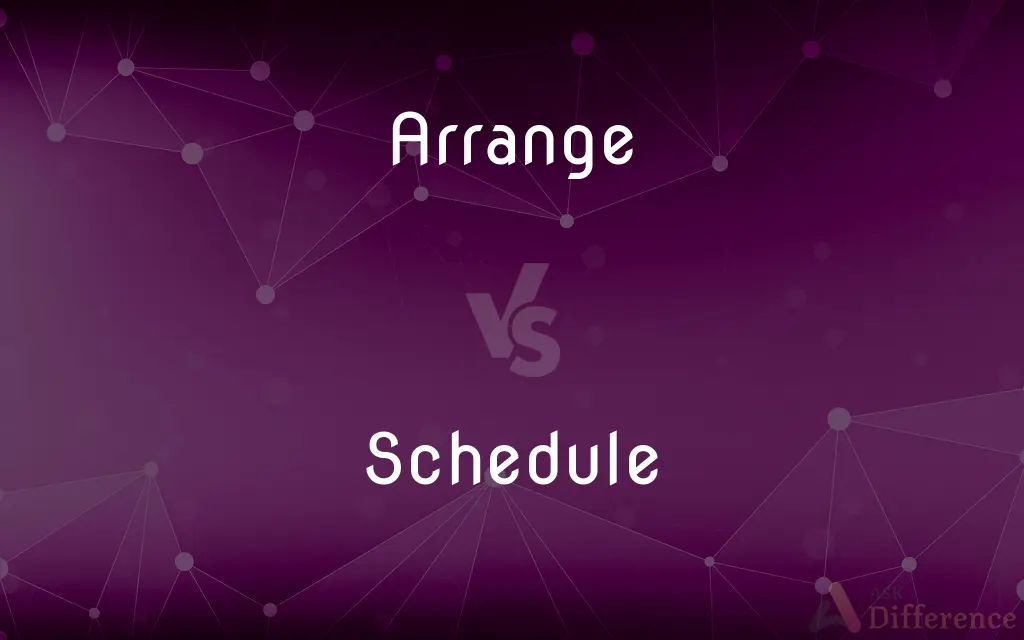Arrange vs. Schedule — What's the Difference?
By Tayyaba Rehman & Urooj Arif — Updated on March 27, 2024
Arrange involves organizing or making preparations for an event or activity, focusing on the setup and coordination. Schedule is about assigning a specific time and date for events, emphasizing time management.

Difference Between Arrange and Schedule
Table of Contents
ADVERTISEMENT
Key Differences
Arrange is about organizing or setting up details for an event, task, or activity, focusing on the logistics and coordination required to bring a plan to fruition. It involves deciding on the how, where, and who aspects, ensuring everything is in place for the event or activity. Whereas, schedule is specifically about allocating a fixed time and date to an event, task, or meeting, highlighting the importance of time management and planning in advance. This ensures that participants are available and prevents clashes with other commitments.
When you arrange something, you're involved in the detailed planning and organization, which may include tasks such as venue booking, guest invitations, and resource allocation. It's about the broader organizational tasks that ensure the smooth execution of an event or activity. On the other hand, scheduling is a more specific task that involves creating a timetable, often listing start and end times for activities or events within a larger plan. Scheduling is crucial for time-sensitive and sequential activities.
Arranging often requires a more holistic view, considering the big picture and how each element fits together to create a successful outcome. It’s a process that might involve negotiation, flexibility, and problem-solving to adapt to changes or challenges. Whereas scheduling is generally more straightforward, focusing on efficiency and clarity in planning, with less need to adapt once times are set.
Arrangement tasks can be more dynamic and may require adjustment as plans develop or change, reflecting the need for adaptability in planning. This flexibility allows for the accommodation of new information or changes in circumstances. On the other hand, a schedule, once made, tends to be more fixed, operating within established parameters and times, emphasizing commitment to planned times and dates.
The process of arranging can be more collaborative, involving discussions and decisions with multiple stakeholders to reach a consensus on the best course of action. It’s about bringing people and resources together effectively. Scheduling, while it can also be collaborative, often follows the arrangement phase, solidifying agreed-upon plans into a structured timetable that participants agree to follow.
ADVERTISEMENT
Comparison Chart
Focus
Logistics and coordination
Time management and planning
Scope
Broad, involving many organizational aspects
Specific, concerning allocation of times and dates
Flexibility
Often requires adaptability and adjustments
Generally more fixed and less prone to changes
Process
Involves negotiation, flexibility, and problem-solving
Focuses on efficiency and clarity in time allocation
Collaboration
Highly collaborative, involving multiple stakeholders
Can be collaborative but usually follows arrangement
Compare with Definitions
Arrange
To make necessary preparations or adjustments.
He arranged his schedule to attend the seminar.
Schedule
To enter or register in a schedule or list for planning.
The conference talks were scheduled in advance.
Arrange
To establish or fix by agreement or negotiation.
They arranged a deal with the new supplier.
Schedule
To appoint a time and place for an event or activity.
The manager scheduled the meeting for 10 AM Monday.
Arrange
To organize or make plans for an event or activity.
They arranged a meeting to discuss the project's future.
Schedule
To create a timetable for events or activities.
The project manager scheduled the tasks to ensure timely completion.
Arrange
To position things in a particular order or pattern.
She arranged the flowers beautifully in the vase.
Schedule
To arrange or plan for something to happen at a particular time.
She scheduled her vacation during the school break.
Arrange
To provide or organize something as a service.
The agency arranged accommodation for all the delegates.
Schedule
To plan an event or activity at a specific time.
They scheduled regular check-ups throughout the year.
Arrange
Arrange is a mythological figure from the Australian aboriginal creation myth of the Alyawarre people for Karlu Karlu. In the myth, the figure Arrange, who is also referred to as the devil man, comes from Ayleparrarntenhe.
Schedule
A schedule or a timetable, as a basic time-management tool, consists of a list of times at which possible tasks, events, or actions are intended to take place, or of a sequence of events in the chronological order in which such things are intended to take place. The process of creating a schedule — deciding how to order these tasks and how to commit resources between the variety of possible tasks — is called scheduling, and a person responsible for making a particular schedule may be called a scheduler.
Arrange
To put into a specific order or relation; dispose
Arrange shoes in a neat row.
Schedule
A plan for carrying out a process or procedure, giving lists of intended events and times
We have drawn up an engineering schedule
Arrange
To plan or prepare for
Arrange a picnic.
Schedule
An appendix to a formal document or statute, especially as a list, table, or inventory
They need a clear schedule of fixtures and fittings
Arrange
To bring about or come to an agreement concerning; settle
Have the bride and groom arranged the date of the wedding?.
Schedule
(with reference to the British system of income tax) any of the forms (named ‘A’, ‘B’, etc.) issued for completion and relating to the various classes into which taxable income is divided.
Arrange
(Music) To adapt or rework (a composition) for other instruments or voices or as another style of performance.
Schedule
Arrange or plan (an event) to take place at a particular time
The release of the single is scheduled for April
Arrange
To come to an agreement
Arrange with a friend for a ride to work.
Schedule
Include (a building or site) in a list for legal preservation or protection
Cowley Bridge has already been scheduled and protected as an ancient monument
Arrange
To cause something to happen or make plans for something to happen
Arrange for a big wedding.
Schedule
A list of times of departures and arrivals; a timetable
A bus schedule.
A schedule of guided tours.
Arrange
(transitive) To set up; to organize; to put into an orderly sequence or arrangement.
Schedule
A plan for performing work or achieving an objective, specifying the order and allotted time for each part
Finished the project on schedule.
Arrange
To plan; to prepare in advance.
To arrange to meet; to arrange for supper
Schedule
A printed or written list of items in tabular form
A schedule of postal rates.
Arrange
To prepare and adapt an already-written composition for presentation in other than its original form.
Schedule
A program of events or appointments expected in a given time
Can you fit me into your schedule Tuesday afternoon?.
Arrange
Rearranged rendition of a song; arrangement
Schedule
A student's program of classes.
Arrange
To put in proper order; to dispose (persons, or parts) in the manner intended, or best suited for the purpose; as, troops arranged for battle.
So [they] came to the market place, and there he arranged his men in the streets.
[They] were beginning to arrange their hampers.
A mechanism previously arranged.
Schedule
A supplemental statement of details appended to a document.
Arrange
To adjust or settle; to prepare; to determine; as, to arrange the preliminaries of an undertaking.
Schedule
A federally regulated list of controlled substances, ranked in classes by potential for abuse.
Arrange
Put into a proper or systematic order;
Arrange the books on the shelves in chronological order
Schedule
One of the ranks or classes in such a list.
Arrange
Make arrangements for;
Can you arrange a meeting with the President?
Schedule
To enter on a schedule
Calculate and schedule each tax deduction on the proper form.
Arrange
Plan, organize, and carry out (an event)
Schedule
To make up a schedule for
I haven't scheduled the coming week yet.
Arrange
Set (printed matter) into a specific format;
Format this letter so it can be printed out
Schedule
To plan or appoint for a certain time or date
Scheduled a trip in June.
Was scheduled to arrive Monday.
Arrange
Arrange attractively;
Dress my hair for the wedding
Schedule
To list or rank (a controlled substance) in a schedule.
Arrange
Adapt for performance in a different way;
Set this poem to music
Schedule
(obsolete) A slip of paper; a short note.
Arrange
Arrange thoughts, ideas, temporal events, etc.;
Arrange my schedule
Set up one's life
I put these memories with those of bygone times
Schedule
(legal) A written or printed table of information, often forming an annex or appendix to a statute or other regulatory instrument, or to a legal contract.
Schedule of tribes
Schedule
One of the five divisions into which controlled substances are classified, or the restrictions denoted by such classification.
A Schedule I drug with a high potential for abuse
Schedule
A serial record of items, systematically arranged.
Schedule
A procedural plan, usually but not necessarily tabular in nature, indicating a sequence of operations and the planned times at which those operations are to occur.
Stick to the schedule
We're running behind schedule
Things are happening ahead of schedule
Schedule
(computer science) An allocation or ordering of a set of tasks on one or several resources.
Schedule
To create a time-schedule.
Schedule
To plan an activity at a specific date or time in the future.
I'll schedule you for three-o'clock then.
The next elections are scheduled on the twentieth of November.
Schedule
To add a name to the list of people who are participating in something.
I am scheduled for classes next month.
Schedule
To admit (a person) to hospital as an involuntary patient under a schedule of the applicable mental health law.
Whether or not to schedule a patient
Schedule
(US) To classify as a controlled substance.
Schedule
A written or printed scroll or sheet of paper; a document; especially, a formal list or inventory; a list or catalogue annexed to a larger document, as to a will, a lease, a statute, etc.
Schedule
To form into, or place in, a schedule.
Schedule
A temporally organized plan for matters to be attended to
Schedule
An ordered list of times at which things are planned to occur
Schedule
Plan for an activity or event;
I've scheduled a concert next week
Schedule
Make a schedule; plan the time and place for events;
I scheduled an exam for this afternoon
Common Curiosities
What is the purpose of scheduling?
Scheduling aims to allocate specific times and dates to events or tasks, emphasizing efficient time management.
Is scheduling more rigid than arranging?
Typically, yes, as schedules are generally fixed to ensure time-specific commitments are met.
What does it mean to arrange something?
Arranging involves organizing or preparing for an event or activity, focusing on setup and coordination.
Can scheduling be changed once set?
While schedules can be adjusted, they tend to be more fixed and changes might disrupt other planned activities.
What skills are important for arranging?
Skills such as negotiation, problem-solving, and adaptability are important for effective arranging.
How does arranging differ from scheduling?
Arranging focuses on the broader organizational tasks, while scheduling is about assigning specific times for these tasks or events.
Can something be arranged without being scheduled?
Yes, arrangements can be made for how things will be organized without assigning specific times, though scheduling often follows.
How do arranging and scheduling complement each other?
Arranging sets up the structure and details, while scheduling assigns specific times, together ensuring effective execution.
What is crucial for effective scheduling?
Clarity, efficiency, and commitment to the planned times are crucial for effective scheduling.
How important is flexibility in arranging?
Flexibility is crucial in arranging to adapt to changes or challenges during the planning process.
Can arranging involve multiple stakeholders?
Yes, arranging often involves discussions and decisions with multiple stakeholders to reach the best outcome.
What is the significance of a schedule in planning?
A schedule helps in managing time efficiently, preventing conflicts, and ensuring that events or tasks occur as planned.
What are the challenges in scheduling?
Challenges include ensuring availability, preventing conflicts, and accommodating changes without disrupting the overall plan.
Why is arranging considered more dynamic?
Because it often involves ongoing adjustments and negotiations as plans develop or change.
How does collaboration play into arranging and scheduling?
Collaboration is key in both, especially in arranging where consensus is needed, and in scheduling to ensure availability.
Share Your Discovery

Previous Comparison
Avert vs. Evert
Next Comparison
Washcloth vs. FlannelAuthor Spotlight
Written by
Tayyaba RehmanTayyaba Rehman is a distinguished writer, currently serving as a primary contributor to askdifference.com. As a researcher in semantics and etymology, Tayyaba's passion for the complexity of languages and their distinctions has found a perfect home on the platform. Tayyaba delves into the intricacies of language, distinguishing between commonly confused words and phrases, thereby providing clarity for readers worldwide.
Co-written by
Urooj ArifUrooj is a skilled content writer at Ask Difference, known for her exceptional ability to simplify complex topics into engaging and informative content. With a passion for research and a flair for clear, concise writing, she consistently delivers articles that resonate with our diverse audience.














































